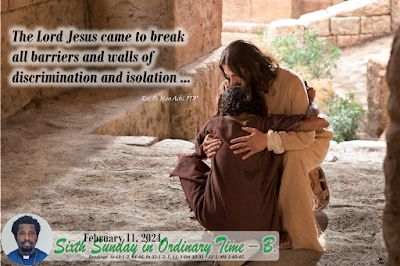GOD OF THE OUTCASTS.
February 11, 2024.
Sixth Sunday in Ordinary Time – B.
Readings: Lv 13:1-2, 44-46; Ps 32:1-2, 5, 11; 1 Cor 10:31—11:1;Mk 1:40-45.
“If you wish, you can make me clean. Moved with pity, he
stretched out his hand, touched him, and said to him, I do will it. Be made
clean.” Mk 1:40
An Amerindian proverb says: “The moon doth not withhold the
light, even from the cottage of a Chandala (outcast).” An Irish proverb adds:
“There is no pain greater than the pain of rejection.”
"Is not man’s life on earth a drudgery?" That was
Job's interrogation that opened us to last Sunday's meditation on the word of
God. But we realized with great faith and hope and rooted in prayer that, no
matter the sufferings and hardships man goes through, the Lord is never far
away from us. He never forsakes us. "The Lord hears the cry of the
poor," would echo the Psalmist with Ps 34. When, in our tragedies or
dramatic situations of life, we call to him in prayer, the Lord always hears
us. This assurance filled last Sunday's liturgy. It is also sustained in
today's liturgy. Our God is the Lord of the outcasts and of the rejected of
society. When human rules and social regulations set barriers and distinctions
and distance between peoples, the Lord breaks those barriers and restores the
togetherness.
Today's readings show us how. The Jewish tradition is known for its sense
of purity and its notion of cleanliness and uncleanliness. Tohorah, in Judaism,
is the system of ritual purity practiced by Israel. Purity (Tohorah) and
uncleanness (tumʾah) carry forward Pentateuchal commandments that
Israel—whether eating, procreating, or worshiping God in the Temple—must avoid
sources of contamination, the principal one of which is the corpse. The Book of
Leviticus but also Number 19 will set the rules. The conception of personal
cleanliness as both a prerequisite of holiness and an aid to physical fitness
is central to Jewish tradition. Valuing in such a way purity, some situations
such as sickness and some actions make a a man unclean and subject him to live
away from others, as an outcast. This, when it is the case of some sickness, could
be well accepted as a measure to avoid or prevent contagion.
That is the case of leprosy, as we read in the first
reading. The Lord ordered Moses on what should be done to his people if someone
was found with leprosy. "He shall dwell apart, making his abode outside
the camp.” This regulation on cleanness was preventive for other members of the
community, but for the leper, it was exclusionist and outcasting. He was cut
off from others and condemned to solitude and isolation.
It is hard to live isolated and away from others. Putting
aside the social and physical stigma, it is emotional, spiritual, and
psychological torture.
Back 2020 to 2022, the whole world was in dreg due to the
COVID-19 pandemic. Isolation, quarantine, and solitude were the regulations in
many countries. Many people died, not so much because of the virus, but mostly
because of solitude and its load of psychological torture. The level of
depression and suicide grew drastically. Though the rule of quarantine was
aimed at saving others' lives, it killed more than one could imagine. No man is
an island, we say. We are social beings. So, cut off from others, we die.
The Lord Jesus came to break all barriers and walls of
discrimination and isolation. Jesus’ mission is open to all, even to the rejected
or forgotten of our societies. In today's Gospel, he makes a revolution. With
him, true purity is spiritual more than corporal. It is all about breaking away
from sin and evilness. To the leper who approached him with the pleading, “If
you wish, you can make me clean,” the Lord showed compassion. Mark says:
"Moved with pity, he stretched out his hand, touched him..." He
touches the unclean, a way to teach that God does not look at our physical and
external uncleanness. He cares more about our inner and spiritual purity. Not
only does he touch him out of pity and compassion, but he also heals him and
restores him to communion with the community. "Go, show yourself to the
priest and offer for your cleansing what Moses prescribed; that will be proof
for them.” Because it was the community, through its leaders which outcasted
him, it is now their task to witness his healing and reintegrate him and
restore him in his rights.
True healing and restoration come from the Lord. He wishes
no one would be away from him. Our sins and the consequences of impurities cast
us out of his embrace. He comes to our encounter and restores us.





Comments
Post a Comment